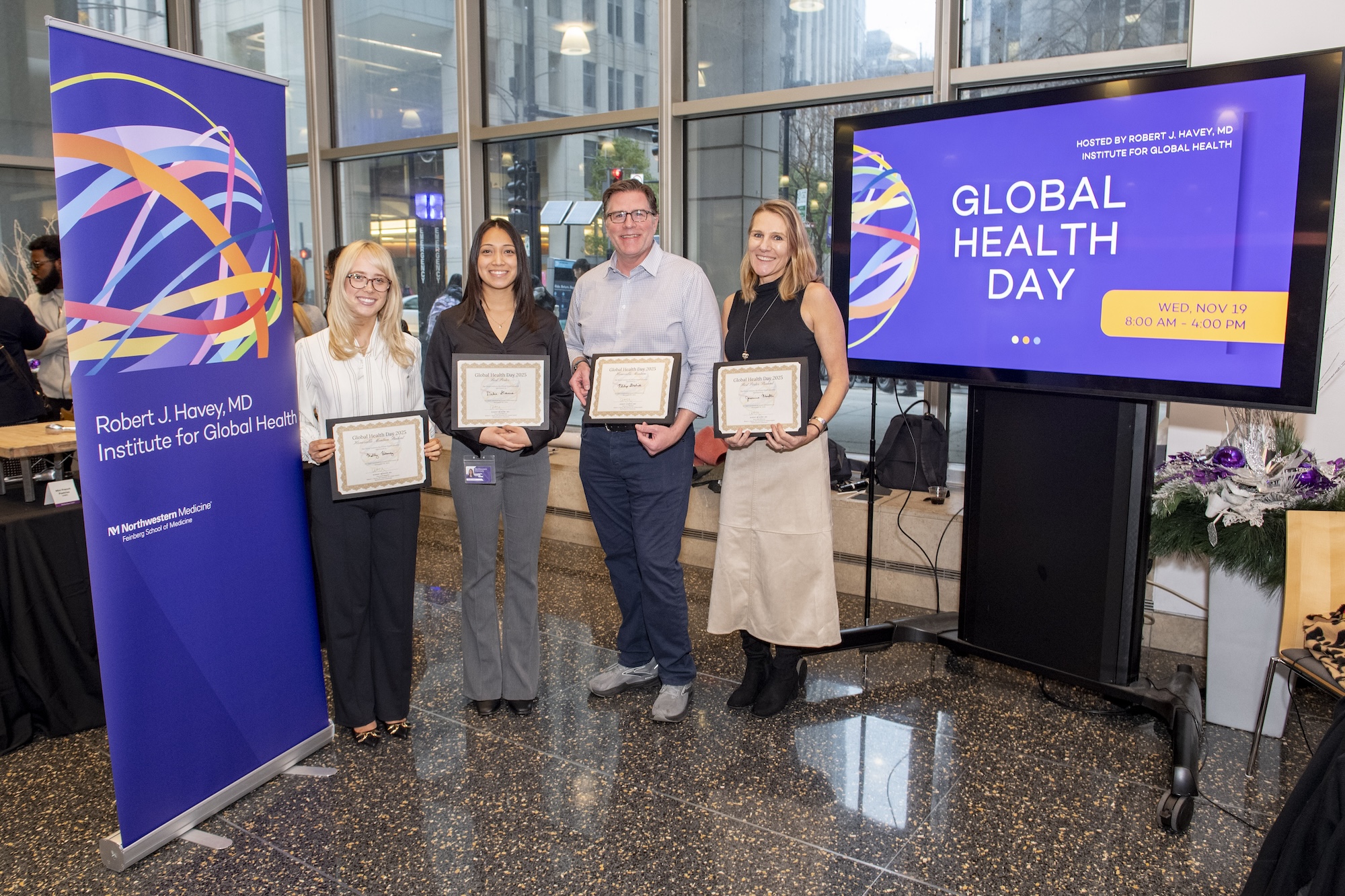Media Coverage
The work done by Northwestern University Feinberg School of Medicine faculty members (and even some students) is regularly highlighted in newspapers, online media outlets and more. Below you’ll find links to articles and videos of Feinberg in the news.
-
TODAY
–
Obesity may cause changes in the brain similar to Alzheimer’s, according to a new study
Being overweight in midlife has been linked to greater risk of developing Alzheimer’s disease or dementia, and a new study shows that brain changes in obese people mirror some of those with Alzheimer’s. However, the research and science isn’t entirely clear. One limitation in the research is that it doesn’t directly report on what people are eating, just that they’re obese, said Linda Van Horn, PhD, RD, chief of nutrition at the Northwestern University Feinberg School of Medicine, who was not involved with the study. “Given that, it leaves a lot of room for speculation and hypothesis generation,” Van Horn said. “Intuitively, you would think it would have an impact on various organs including the brain.” While the hope is that weight loss could stop or reduce the brain degeneration, “we, unfortunately, are discovering more and more that there are certain points of no return,” Van Horn said.
-
NPR
–
Wegovy works. But here’s what happens if you can’t afford to keep taking the drug
“This hormone is telling your brain, I’m full, I don’t need to eat anymore,” explains Dr. Robert Kushner of Northwestern University, who treats Yolanda Hamilton. Kushner also serves on a Novo Nordisk medical advisory board, for which he receives an honorarium.
“What the pharmaceutical companies have done is taken this hormone that is naturally occurring and restructured it into a drug,” he explains. So, it’s not a surprise that when people stop taking the medicine, they start to feel hungrier, he says.
-
New York Times
–
The Sneaky Allure of a Detox
On social media, diet enthusiasts claim that a sludge of papaya seeds can fight off parasites. Every year, the wellness world hawks “cleanses,” often liquid diets that mainly consist of vegetable and fruit juices. A day or three (or eight) of drinking all your meals, and you’ll purge any toxins from your body, cleanse manufacturers say. Your skin will clear; your stomach will shrink. You will feel, more or less, pure. But there is scant evidence to back any of these claims. “There’s no major research done on most of the cleanses that are out there,” Dr. Melinda Ring, an integrative medicine specialist at Northwestern Medicine, said. However, some people do say that they feel better while on a cleanse — that they sleep better, have more energy or think more clearly. Nutrition experts say that people who try cleanses may report positive benefits in the short term — but not because of the specific slush they’re drinking.
-
ABC 7 Chicago
–
15-year-old boy performs life-saving CPR on mom after sudden cardiac arrest
According to the American Heart Association, roughly every 40 seconds, someone in this country has a heart attack. And heart disease is the number one killer for both men and women in the U.S. But, the CDC found that only about 56% of women are aware of that. Kristen Walenga is a survivor of sudden cardiac arrest. She collapsed in 2019 while at home with her children. Her 15-year-old son saved her life. Walenga said she didn’t even know her son had learned CPR while in middle school. Now, she’s working to make sure others know how to perform this life-saving procedure. Mercedes Carnethon, PhD is the president of the American Heart Association Chicago Metropolitan Board and vice chair of preventive medicine at Northwestern University Feinberg School of Medicine. “The risk factors for heart disease for women and men are very similar. We often are very aware of the genetic component. But, an even larger component is our lifestyle behaviors. Smoking is one of the leading, modifiable behavioral risk factors for cardiovascular disease. Inactivity, short sleep or poor quality sleep and a poor diet. All of those contribute to the development of risk factors such obesity, high blood pressure, diabetes. And those combine to be the reasons why we see cardiovascular disease in women and men,” Carnethon said.
-
WGN
–
Do you need an annual checkup? New guidance on doctor office dos and don’ts
David Liss, PhD, research associate professor of medicine at Northwestern University Feinberg School of Medicine says, “Not everyone needs an annual checkup.” Instead of an exam, think of visits as check-ups. And that check up may not include a comprehensive physical exam or routine lab testing. “When you talk about unnecessary testing, you can often have false positive results and when you have false positive results, that can lead to more testing patient worry and patient anxiety,” he said. So, who should get annual check-ups? People ages 65 and older, people who are overdue for recommended preventive care, patients at high risk of undiagnosed chronic illness and people who rate their health as poor or fair. “In these groups, there’s a lot of reasons why annual check-ups can be quite helpful,” Liss said.“ People who are already regularly getting primary care, there’s a good chance that these conditions are being detected,” Liss said.
-
New York Times
–
Saunas Are Filling Up, but Are They Actually Good for You?
Sweating in small hot rooms has been a wellness staple for centuries. But don’t believe everything you here. There isn’t much data on global or nationwide sauna use, but the marked does seem to have revived, driven mainly by users seeking health benefits. However, people with heart conditions, like angina or congestive heart failure, should speak to a doctor before going to a sauna, said Dr. Melinda Ring, director of integrative medicine at Northwestern Medicine. Pregnant women should also consult their physician. And if you’re already at the risk of getting dehydrated — for example, if you’re intoxicated — you should also steer clear of the sauna, she advised. Some spa companies advertise the illusion of a sauna “detox” — the idea that sitting in the heat or steam can leach chemicals from your body. “There’s this image of, ‘All the sweat is going to carry these toxins out,’” said Dr. Ring. “That’s really not how it works.” It’s not clear that sauna therapy can lower overall toxin loads in the body, she said.
-
New York Times
–
The Life-Changing Magic of a Urologist
Urologists often deal with health problems that arise from two intimate functions: peeing and sex. There are two parts of a urologist’s job. “There’s the serious illness stuff, like cancers,” said Nelson Bennett, a professor of urology at Northwestern University Feinberg School of Medicine, who specializes in male sexual function. “But there’s a big chunk of our practice that is basically quality of life. I tell my patients that no one dies of not having an erection, but they’re still suffering.” All of this may be why people who have seen a urologist (present company included) sometimes say the results are life altering. There are treatment options for almost every erectile problem, including oral medications, injectable medications, surgery and cognitive behavioral therapy, Dr. Bennett said. Although it can be tempting to furtively order medications such as Viagra on direct-to-consumer websites, a practice that Dr. Bennett found, in a 2021 study, is dramatically increasing, he said there are several reasons to see a specialist instead. “We can actually begin to figure out why you’re having the problem, as opposed to just taking medication to cover it up,” he said. Some medications can also affect erections, such as antidepressants, which can cause orgasms to be delayed, or vanish altogether. And a urologist can screen for those, he said.
-
ABC News
–
California massacres suggest phenomenon of ‘mass shooting contagion’: Experts
Following four California mass shootings in the span of eight days that left 25 people dead and 17 injured, some gun violence researchers said they’re concerned that a phenomenon known as “mass shooting contagion” is occurring across the state. “There are mass shootings waiting to happen, so one of them can influence the other,” Lori Post, director of the Buehler Center for Health Policy and Economics at Northwestern University Feinberg School of Medicine, told ABC News. Post, who keeps a database of mass shootings dating back to 1966, added, “If a would-be shooter sees all the attention of another mass shooter, it may incentivize him to carry out his plan. But one mass shooting does not inspire a normal person to commit a massacre.”
-
US News & World Report
–
About 1 in 3 American Adults Has an Allergy
As many as 1 in 3 adults and 1 in 4 kids suffers from a seasonal allergy, a food allergy or eczema, the latest government data shows. Caused by a reaction to plant pollen, seasonal allergies were the most common type of allergy in both kids and adults. Symptoms include sniffling, coughing and itchy eyes. Peter Lio, MD, a clinical assistant professor of dermatology and pediatrics at Northwestern University Feinberg School of Medicine in Chicago, said he is seeing a tremendous number of allergic patients in his practice. It seems that there has been an increase over prior decades, though it is not clear why, Lio said. Chemicals and pollutants in the environment can damage your skin, gut and lung barriers, and “once damaged, allergens can enter into our bodies in an abnormal way and are more likely to cause allergic sensitization,” he explained. There is good news on the eczema front, Lio noted. “We are better than ever at treating eczema and doing so with safer treatments, and we are now starting to talk about the concept of remission or getting people so much better that they can reduce or even stop some of their treatments,” he said.
-
The Washington Post
–
Many mass attackers motivated by personal and work grievances, report says
Half of mass attackers in the United States were retaliating for personal, domestic or workplace-related grievances, and many used firearms that were obtained legally. The researchers found that three-quarters of the perpetrators had displayed behaviors or communicated in a way that concerned others before the attack. About 29 percent of attackers were described either by themselves or others as “withdrawn, loners or anti-social,” the report said, and more than half had experience mental health symptoms before the attack. Lori Ann Post, PhD, who studies mass killings as a public health issue at Northwestern University Feinberg School of Medicine, said mass shooters age 26 and older tend to be acting in retaliation for a perceived loss or failure. “The older ones seem to have left home; they’ve separated from their parents, but then they self implode and destroy their life,” she said. “They want revenge, they’re disgruntled, they want payback.” She said the report should have more narrowly defined mass attacks as incidents in which a perpetrator killed four or more people, because such attackers tend to be more organized and thoughtful in their planning. However, “No matter who you are, what data you use, there is an escalation going on,” she said.






